
In a special interview for Iskra.bg, the former director of the Executive Agency for Forestry and former member of parliament, Alexander Dunchev, revealed how large-scale and comprehensive the corruption scheme that has conquered Bulgaria is. He explained through what channels the pressure on the institutions and how certain business interests are promoted and protected at the highest level. We publish the interview with Alexander Dunchev without editorial intervention:
– Mr. Dunchev, you started the column „Is there a way and is there a who?“. What is its purpose?
– The aim is to raise questions in society that few people have raised so far. People have counted on the state to do their job for them. They saw that this was not possible. People rely on politicians to do their job, but we also see that they face a problem among Bulgarian politicians, which is that the pursuit of power is always placed before principle and the pursuit of solutions and effective results from the fight against the mafia and the restoration of statehood. For people to be a little more critical of those they believe will fix their lives and to understand that in the end, it’s not really someone else, but people themselves who have to get their hands together and fix their lives , I thought it was nice with examples to hint these questions to people. Today I also published a post about a battle we are fighting for the Bansko ski area, about the abuses there, about the financial schemes. The Ministry of Environment and Water last year began looking for a way to revoke the concession for the ski area because of the financial irregularities. But this is how the politicians who started to do it in the person of Toma Belev were also shekarted and now they currently do not have carte blanche to continue this fight. And it can be seen that we lost all the battles against the timber mafia and the mafia that is building Bulgaria very quickly, because the mafia regrouped, regrouped and all those who fought these battles were somehow thrown out.
– Mr. Dunchev, you say ski area Bansko. You very often publicize specific companies winning tenders in a way that shouldn’t happen. Where do you think the problem is? Where is the corruption – local or national?
– In all cases, it is about the same scheme – favoring specific companies both in logging and in construction along the Black Sea, and in ski areas in the mountains. Favoring through all possible procedures – from environmental procedures, to the lack of financial supervision by the state on all these companies. How does this happen? All our investigations show that this happens in the same way everywhere – regardless of the field. And it is – top notch – from top to bottom. There is no way, and I showed it recently with a connection between the owners of the Bansko ski area with one of the parties in the National Assembly and with one of the large thermal power plants. The connections are political and they start at the highest level. It starts with the leadership of the parties, which parties, through the financial support of certain businesses, get deputies into the National Assembly. These MPs are starting to chase one main goal – how to serve these businesses back. We see this every time and everywhere. And even if we have some respectable prime minister, this whole army of bought MPs starts wringing their hands. We observed this very well last year, because we were inside, in the government of Kiril Petkov and Asen Vasilev. But I have also seen it in the official government, because I was involved in the Forestry Executive Agency. And it is perfectly visible how deputies, the heads of institutions elected by them – ministries, other state offices, and it even goes as far as wringing the hands of the Prime Ministers themselves. Even if we take the case of Boyko Borisov and assume that he is extremely honorable, since he has an army of bought deputies, including in his party, there is a way that his hands will be twisted. And one day he admitted on television that the owner of Bansko is Tseko Minev, which means that he did not totally agree with everything that was happening, but apparently his hands are wringing too. This is how businesses, when they buy MPs, the MPs, when they enter the National Assembly, they start setting the agenda of the institutions, including at the level of the Prime Minister. And when the prime minister says this one will not be caught, this company must be protected, the prosecution has stretched an umbrella over a third company or a fourth minister and down, all the officials know now that no one can afford their head to try to stop this process. I at the Forestry Agency tried to stop it and I succeeded to some extent and I know how the pressure works. I also went to the Presidency to get used to it. Many times they did not get used to the minister because I refused to serve this corrupt pressure of various timber businesses and hunting feudal lords. And whoever allowed himself to rebel against this pressure, which comes from the highest level – from top to bottom, he is thrown out of the system. Thus, an awful lot of employees of the eco-ministry who wanted order in the environment were thrown out of the system. In the forests the same way – almost all the civil forest directors I knew were thrown out of the system just because they got stuck. The last example is how I was more or less thrown out of the political system because I was stumped for all this. So in Bulgaria, there is still no chance for honorable politicians, incorruptible politicians and statesmen to protect the state and public interest, if the public does not understand and realize where all the problems come from and that they come during the election of deputies, and therefore it is very important to ask the right questions of the deputies, because it is up to them to solve all these problems that we are talking about.
– How then can the whole scheme that you describe and which covers all powers – National Assembly, Executive Power, Presidency, Judiciary – be put to an end through public pressure or from within through a reform of the political system itself?
– Exactly! Exactly! And the only two chances to fix all this is to have a hypercritical and hypervigilant civil society, from which we are visibly very far away, and here we have more to develop and invest in this process. And the other one that was closer, but we’re seeing it recede as an option as well, is to reform the political parties so that they’re much more open to criticism, they’re much more transparent. If we want to change the governance of the state and make it as democratic and transparent as possible, we must first do it in the parties. We had this problem at the beginning with „Green Movement“, with „Yes, Bulgaria“ and we see that at the moment we also have it with „Continuing the change“, that is, the parties we rely on to solve the huge problem of dealing with the mafia that has taken over the state, we must first transform them. That’s why I keep saying that we need to change the „Change“ and democratize „Democratic Bulgaria“ before we start doing it for the whole country. The processes that are going on there do not yet create the premise that they will be able to solve the problems at the state level, precisely because of all these cases.
– You also raised the important issue of illegal replacement of forests in Bulgaria. You calculated back in 2019 that the losses from them for the country amounted to BGN 1 billion. Is there a legal possibility for these substitutes to be revoked?
– This case is absolutely and solely political at the moment. And I’ll give an example why. In 2020, several of the companies themselves offered to terminate their contracts, and they have been terminated. There are several public forests that were returned to the state by the so-called forest substitutes. That is, there are good examples. The only thing that had to be done was maximum publicity and transparency on the part of the state – the Ministry of Agriculture, which is responsible for the whole process. And I tried to go around them a little because there was great resistance there, they serve all these businesses that are behind the substitutes, and as the director of the Executive Agency for Forestry I started behind the minister’s back to try to create this transparency. We did some round tables. We had public debates about where the problems with substitutes came from, how all these costs were calculated. I introduced to the public two lawyers from the Executive Agency for Forestry who went on behalf of the Ministry of Agriculture in the court cases to tell how they lied great with the false market assessments that the courts require and accept in complete violation of all the rules for preparing market assessments. I have tried, through this transparency, to shed light on this whole scheme so that there can be public and media pressure on the court so that the false market valuations that currently legitimize substitutions are not accepted. When I went to the National Assembly, there I tried to continue this process through parliamentary control. But then all the other problems hit me. The lack of total support from the party for all forest reforms and I simply myself and my colleague Zornitsa Stratieva from the Green Movement squatted because we no longer had the strength to fight on all fronts and I started to fight on only a few fronts – logging, where we saved BGN 100 million last year, framing in the forests and that was all I could do. And for the substitutes, after several parliamentary questions, I ran out of strength and had no more strength to fight.
– Can this issue be resolved with a legislative change?
– In principle, it is also possible with a legislative change, if all market valuations are required to be public, which we proposed in the Forest Law last year, to illuminate everything that happens in a courtroom with these false market valuations, by illuminating and them and by giving companies the opportunity to terminate replacement contracts even more easily. Thus, the companies that have participated, the bona fide ones, can more easily recover money or any costs that they have accumulated. So that’s what we had suggested as well. The point is that there seems to be absolutely no political interest anywhere for this to happen, and that’s why I say the only chance is to go back to the civil war and educate people on how to pursue their interest. This civil war was fought by environmental organizations. Apparently they will have to continue to lead her. It was all happening and we will have to pull this experience out of the drawer – thanks to the European Commission. That is, we will have to continue this battle with the help of the European Commission. For two years we deluded ourselves that we would cope with our own forces – civilly and politically. Apparently, this will not happen and we will have to work again with the European Commission and the MEPs, who helped us for years with parliamentary issues in the European Parliament and with committees and with inspections in Bulgaria. This was the way to save the Bulgarian nature and we will obviously have to continue in this way.
– What are the things that urgently need to be done in the green policy in Bulgaria?
– The most urgent thing that the state needs, not only in the green policy, but in all policies, is to create conditions for the election of honorable people in the management of the state. They don’t have to be the greatest professionals. At the moment, the corruption in the state is so great that it is enough to create conditions for the institutions to be managed by honest and incorruptible, the best possible moral people, without the need for any experience. I have seen that these people will be able to cope and take the state out of the swamp of the mafia. This is the most important task. Starting not with the state itself, but with the parties themselves. We see that we do not have such a clean process in the parties themselves, but how people rely on us to have it for the state. So we go back to the beginning, that if we want the state to choose respectable cadres so that they can solve all these problems, we must first do it for the parties. And we see that the parties are currently throwing out a large part of their respectable cadres.









